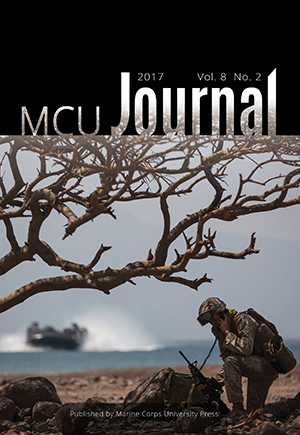 MCU Journal, vol. 8, no. 2
MCU Journal, vol. 8, no. 2
Fall 2017
Lessons Learned
pdf
ePUB
From the Editors
LESSONS LEARNED (OR NOT)
Congress and the Marine Corps: An Enduring Partnership
Nathan Packard
MCUJ vol. 8, no. 2
https://doi.org/10.21140/mcuj.2017080201
Abstract: During the past 75 years, the U.S. Marine Corps has cultivated and sustained a close working relationship with Congress. This article surveys historical examples from the post–World War II defense unification debates and from the post–Vietnam War era to explore the role Congress plays in military innovation as well as the importance of congressional oversight.
Keywords: Congress, Office of Legislative Affairs, Marine Corps, civil-military relations, defense unification, Vietnam War, congressional oversight
ABOUT THE AUTHOR
Dr. Nathan Packard is an assistant professor of military history at Marine Corps Command and Staff College. His other teaching duties have included Georgetown University, the U.S. Naval Academy, and the U.S. Naval War College. He holds degrees from Holy Cross (BA), the Naval War College (MA), and Georgetown University (MA, PhD). Packard is a Marine veteran of Operation Iraqi Freedom, having served as an advisor to an Iraqi infantry battalion in al-Anbar Province in 2007. He is currently a Reserve officer serving with Marine Corps History Division.
Winning the War and Winning the Peace:
Reconciling Occupation Law and the Small Wars Manual
Col Joseph A. Lore
MCUJ vol. 8, no. 2
https://doi.org/10.21140/mcuj.2017080202
Abstract: The Small Wars Manual, first published in 1940, documents hard lessons learned from the Marine Corps’ involvement in small-scale conflicts during the first half of the twentieth century. Comprising the combined experience of a generation of Marine Corps leaders, the Small Wars Manual derives those lessons from Marine expeditions to places such as the Philippines, Cuba, Haiti, Nicaragua, and the Dominican Republic. While many of the principles contained in the Small Wars Manual chapter on military government remain relevant to current and future stability operations, the manual must be updated to ensure that planners and commanders meet the requirements of international law.
Keywords: military government; occupation law; Operation Iraqi Freedom; OIF; post-conflict operations; small-scale conflicts; Small Wars Manual; stability operations; tactics, techniques, and procedures; TTPs
ABOUT THE AUTHOR
A career Marine Corps officer and judge advocate, the author’s previous service includes deployments to Iraq with 1st Marine Division in 2003 and to Afghanistan with the 2d Marine Expeditionary Brigade from April 2009 to April 2010. He extends his thanks to Dr. Paolo Tripodi and Dr. Alexandra Kindell for their patience, encouragement, and commitment to the professional development of Marines. The views and opinions expressed in this article are those of the author and do not necessarily reflect the official policy or position of the Department of Defense, the Department of the Navy, or the U.S. Marine Corps.
Applying Rapid Acquisition Policy Lessons
for Defense Innovation
Jonathan Wong
MCUJ vol. 8, no. 2
https://doi.org/10.21140/mcuj.2017080203
Abstract: With the Department of Defense’s (DOD) recent focus on importing Silicon Valley-style innovation practices to its acquisition process, it is important to assess an organization’s ability to effectively merge new concepts and practices with the existing acquisition system. This article examines applicable lessons from the DOD’s rapid acquisition practices during Operations Iraqi Freedom and Enduring Freedom, which functioned counter to many conventional acquisition processes. This research finds that DOD can incorporate innovation practices by dispersing organizations focused on new capabilities development across the agency to avoid direct competition with the existing acquisition system, allowing them to refocus and adapt often, and by ensuring senior leader championship of these efforts.
Keywords: defense acquisition, defense procurement, rapid acquisition, defense innovation, program management, organizational culture, Operation Iraqi Freedom, Operation Enduring Freedom, acquisition processes, Defense Innovation Unit Experimental, DIUx, Joint Improvised Explosive Device Defeat Organization, JIEDDO, Rapid Equipping Force, REF
ABOUT THE AUTHOR
Jonathan Wong is an adjunct political scientist at the Rand Corporation. His research focuses on the intersection of new technology and defense acquisition. Prior to Rand, he served in the U.S. Marine Corps as an enlisted infantryman, infantry officer, and manpower planner. He holds a PhD in policy analysis from the Pardee Rand Graduate School, an MA in security studies from Georgetown University, and a BA in political science from the University of California, San Diego.
White Warships and Little Blue Men: The Looming
“Short, Sharp War” in the East China Sea over the Senkakus
James E. Fanell and Kerry K. Gershaneck
MCUJ vol. 8, no. 2
https://doi.org/10.21140/mcuj.2017080204
Abstract: China claims Japan’s Senkaku Islands and vows to seize them in a “short, sharp war,” if necessary. China’s successful seizure of the islands would shatter the Japan-America security alliance and severely undermine U.S. credibility. This study examines China’s attack campaign by tracing its territorial claims to the East China Sea and by addressing its Senkakus campaign doctrine, the military and paramilitary forces it will employ, how the campaign will unfold, the timing of the attack, how China might counter U.S. intervention, and steps the United States and Japan should take to deter it.
Keywords: short, sharp war; China Dream; great rejuvenation; Diaoyu Dao Islands; Senkaku Islands; East China Sea; Japanese Coast Guard; Scarborough Shoal; Scarborough Model; Xi Jinping; active defense; local war under conditions of informatization; people’s war; People’s Armed Forces Maritime Militia; PAFMM; little blue men; maritime law enforcement forces; MLEF; China Coast Guard Bureau; People’s Liberation Army Marine Corps; strategic support force; counterintervention strategy; three warfares; political warfare; decade of concern
ABOUT THE AUTHORS
James E. Fanell is a government fellow at the Geneva Centre for Security Policy and former director of intelligence and information operations (N2/N39) for the U.S. Pacific Fleet, specializing in Indo- Asia-Pacific security affairs and the Chinese Navy. Kerry K. Gershaneck is the distinguished visiting professor at Chulachomklao Royal Military Academy in Thailand, senior associate with Pacific Forum at the Center for Strategic and International Studies, senior research associate with Thammasat University’s German-Southeast Asian Center of Excellence for Public Policy and Good Governance, and a retired U.S. Marine Corps officer.
REVIEW ESSAY
BOOK REVIEWS